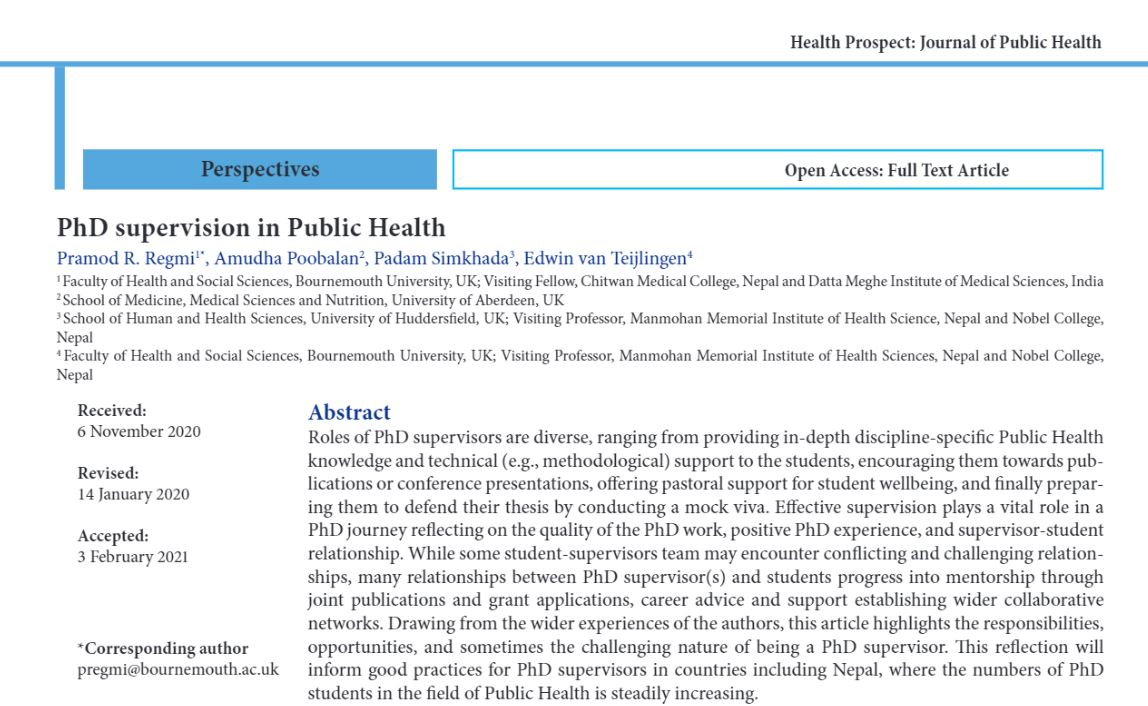 Today the Journal of Education and Research published online our paper ‘Reflections on Variations in PhD Viva Regulations: “And the Options Are …”’. [1] The paper outlines that examining PhD research in the form of a doctoral thesis is specialist work, which is why few people know the potential variations. This paper highlights the different options that are available for PhD examiners. There are four general options: (1) pass, (2) rewrite and resubmit; (3) lower degree, with or without resubmission; and (4) fail the PhD. However, from our experience, of both being examined for our own PhDs and examining others at a range of different universities, we have noted a considerable variety in detail within these common options. This paper outlines a variety of outcomes of a PhD examination, followed by four short case studies, each reflecting on a particular aspect /differences we experienced as examinees or as examiners. This paper further aims to alert PhD candidates and examiners to study the examination rules set by the awarding university, as the details of the PhD examination outcome, and hence the options available to both examiners and the students may differ more than one might expect.
Today the Journal of Education and Research published online our paper ‘Reflections on Variations in PhD Viva Regulations: “And the Options Are …”’. [1] The paper outlines that examining PhD research in the form of a doctoral thesis is specialist work, which is why few people know the potential variations. This paper highlights the different options that are available for PhD examiners. There are four general options: (1) pass, (2) rewrite and resubmit; (3) lower degree, with or without resubmission; and (4) fail the PhD. However, from our experience, of both being examined for our own PhDs and examining others at a range of different universities, we have noted a considerable variety in detail within these common options. This paper outlines a variety of outcomes of a PhD examination, followed by four short case studies, each reflecting on a particular aspect /differences we experienced as examinees or as examiners. This paper further aims to alert PhD candidates and examiners to study the examination rules set by the awarding university, as the details of the PhD examination outcome, and hence the options available to both examiners and the students may differ more than one might expect.
This publication adds to our earlier work on the roles of PhD supervisors providing in-depth discipline-specific Public Health knowledge and technical (e.g., methodological) support to the students, encouraging them towards publications or conference presentations, offering pastoral support for student wellbeing, and finally preparing them to defend their thesis by conducting a mock viva. Our earlier paper focused on the responsibilities, opportunities, and sometimes the challenging nature of being a PhD supervisor in the field of Public Health in Nepal. [2]
Prof. Edwin van Teijlingen
CMMPH
References:
- van Teijlingen, E., Simkhada, B., Regmi, P. ., Simkhada , P. ., Hundley, V. ., Poudel, K. C. (2022). Reflections on Variations in PhD Viva Regulations: “And the Options Are …”. Journal of Education and Research, 12(2), 61-74. https://doi.org/10.51474/jer.v12i2.624
- Regmi, P., Poobalan, A., Simkhada, P., van Teijlingen, E. (2021). PhD supervision in public health. Health Prospect, 20(1), 1-4.











 Conversation article: Why so many people drown at the water’s edge
Conversation article: Why so many people drown at the water’s edge Workshop on longitudinal studies in three countries
Workshop on longitudinal studies in three countries New Bournemouth University public health paper
New Bournemouth University public health paper New ACORN-funded paper published. When time is short but passion for food is strong, food day-tripping may be the answer!
New ACORN-funded paper published. When time is short but passion for food is strong, food day-tripping may be the answer! Royal Society of Chemistry Outreach Fund: Open for Applications
Royal Society of Chemistry Outreach Fund: Open for Applications Last reminder – MSCA Postdoctoral Fellowships 2024 internal deadline next week
Last reminder – MSCA Postdoctoral Fellowships 2024 internal deadline next week Horizon Europe – EuroHPC and MSCA PF webinars
Horizon Europe – EuroHPC and MSCA PF webinars